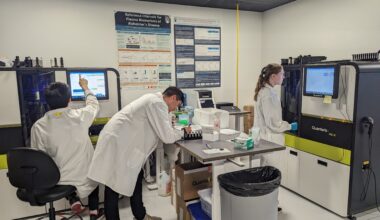The UBC Institute of Mental Health (IMH) with the support of Sunny and Stewart Marshall launched the IMH Marshall Scholars and Fellows Program in Mental Health in 2019. The program supports the post-graduate training of early career investigators in translational research aiming to increase capacity in academic psychiatry in line with the vision and commitment of the IMH and the donors.
Meet the six scholars for 2022-23:
THOMAS CHAO, PhD
Project Description:
“People with concurrent disorders (PCD) have worse mental health and treatment outcomes than any other mental health group. Research on PCD and their treatment outcomes is severely lacking, as they are often excluded from studies due to the severe and complex nature of their disorders. With 1,500 planned participants, ROAR-CANADA is assembling the largest sample of people with concurrent disorders worldwide. For the past year, we have been successfully running ROAR CANADA at 4 sites in BC and Ontario. This 5-year Health Canada-funded project collects a wealth of unprecedented information pertaining to patient profiles, as well as unique information, such as self-report data on victimization and violence and administrative data, before and after the concurrent disorder treatment.
My project aims to enrich the current assessment protocol with the inclusion of neurocognitive tests and measures of stress, including biomarkers of acute and general stress. Cognitive functioning and stress have been shown to impact treatment outcomes across substance-using and mental health populations, but they have not been studied in PCD as a single clinical group. The knowledge obtained through this study will contribute to a more comprehensive assessment of concurrent disorders, and the risk factors and prevention strategies for overdose and relapse.”
Supervisor: Dr. Christian Schütz
ALOK KULKARNI, MD
Project Description:
“Bipolar disorder (BD), is a severe mental illness characterized by dramatic shifts in mood, energy, and activity levels causing substantial impairment in interpersonal and social functioning. The disease course has recurrent periods of highs (mania) and lows (depression) in a person’s mood and activity levels. Globally, BD is the 4th leading cause of disability in the 15-24 year old age group. It is associated with substantial functional impairment, and carries with it a high risk of suicide. Treatment outcomes have remained poor in BD. Previous research entailing early interventions has shown sub-optimal results making the case for even earlier interventions.
Our current study will identify persons who are at high-risk to develop BD, and compare the effectiveness of a medication, minocycline, as compared to the placebo, in preventing the emergence of the aforementioned periods of highs and lows. Research has identified inflammation as the primary contributor for the progression of BD. As minocycline is an antibiotic commonly used to treat acne in adolescents given its anti-inflammatory properties, it has great potential to arrest the disease progression by its anti-inflammatory and anti-oxidant actions. We hypothesize that fewer high-risk subjects receiving minocycline will experience mood episode(s) as against those receiving the dummy pills during the 1-year study period. If our hypothesis turns out to be true, it will provide the impetus for a larger and more definitive clinical trial. If minocyclin’s effectiveness is confirmed in preventing BD in high-risk subjects, it will transform the clinical management of BD.”
Supervisor: Dr. Lakshmi Yatham
KIRSTEN MARCHAND, PhD
Project Description:
“Since 2016, approximately 5,000 adolescents and young adults between the ages of 15 and 29 have died from opioid-related overdoses in Canada. This has left families and communities to mourn the loss of their loved ones. These overdose deaths can be avoided by getting youth the help they need, as early as possible. However, most of the currently available help has focused on adults, under the assumption that what works for adults will also work for youth. Unfortunately, research in British Columbia has recently found that this is not the case. Instead, existing options for help do not meet youths’ opioid treatment needs and preferences.
The main goal of this study is to determine how to best help youth who use opioids. To meet this objective, we will engage youth, parents/caregivers, and service providers in a research study. This study will explore priorities for opioid use treatment delivery. It will also determine how to best define the benefits of opioid use treatment for youth. These findings will then be used to study how well youths’ priorities are being met by available treatments and services across British Columbia. The findings of this study will help service providers and policy makers to deliver opioid treatments in a way that will better meet youths’ unique needs. The findings will also help future researchers to make sure that they are studying what matters most to youth.”
Supervisor: Dr. Skye Barbic
JOHN-JOSE NUNEZ, MD
Project Description:
“This project will use computerized ‘machine-learning’ to predict if, and when, a patient’s depression will recur after being treated successfully. If we can use machine learning to accurately predict when a patient’s depression is just starting to return, we may be able to offer extra medications or therapy to stop it from worsening. Depression is the second-biggest cause of disability around the world, and most patients will have more than one episode, so a prediction that works well would be clinically useful.
So far, researchers have used smartphone data by itself to predict when a patient’s depression will recur. In this project, we want to improve these predictions by training our algorithms with additional clinical data, such as other illnesses they have and how quickly their depression has improved with treatment in the past. Using both smartphone and clinical data from a recent study we completed, we will train algorithms using machine learning to predict when patients’ depression will recur. This will determine if clinical data can improve the accuracy of prediction with smartphone data alone. Our study has more patients and more comprehensive clinical data than researchers have previously used, which may also increase our ability to predict recurrence. We hope that a more accurate prediction of depression recurrence will help doctors and mental health clinicians to keep patients depression free by earlier treatment before their depression returns.”
Supervisor: Dr. Raymond Lam
MEGAN ROWLAND, PhD
Project Description:
“Autism spectrum disorder (ASD) is one of the most prevalent forms of developmental brain disorders, affecting 1 in 66 children in Canada. ASD is characterized by impairments in social communication, restricted interests, and repetitive behaviours which can be a significant burden on families, social services and the healthcare system. It is well established that ASD is heritable, however, there are hundreds of genes that have been implicated. One group of genes that are of particular interest are part of the Brg1 Associated Factor (BAF) complex. Mutations in the BAF complex have recently been linked to ASDs but it is still unknown how mutations in BAF genes actually lead to ASDs. A novel, neuron specific version of the BAF complex has emerged as a promising candidate.
My project will investigate the loss of the neuronal BAF complex specifically in parvalbumin (PV) inhibitory neurons in mice. I hypothesize that loss of the neuronal BAF complex in PV neurons will alter gene expression that is necessary for proper function resulting in ASD-like behaviours. To understand the underlying cause of any behavioural changes, we will employ next generation sequencing to investigate alterations in gene expression and DNA structure in neurons that have lost the neuronal BAF complex. The proposed research represents a unique interface between neuroscience and computational biology for understanding gene expression in ASDs. By providing insight into the etiology of ASD, this work will provide the foundation for future rescue experiments to identify novel therapeutic targets for ASD.”
Supervisor: Dr. Annie Ciernia
WALTER SENA, MD
Project Description:
“Cognitive assessment has been a staple of medical treatment for over 50 years, used for diagnosis and treatment planning of patients with neurocognitive disorders. Functional magnetic resonance imaging (fMRI), although it measures brain activity of cognitive processes, has not yet been used clinically in cognitive assessments.
My project aims to help incorporate fMRI knowledge into clinical practice by proposing an fMRI-specific cognitive assessment procedure, including a novel normed fMRI-specific testing battery. If successful, this research will develop the first fMRI-based neurocognitive assessment battery that can be used for the diagnosis and treatment planning of patients with neurocognitive disorders.”
Supervisor: Dr. Todd Woodward


